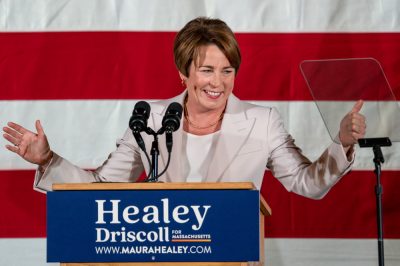Gov. Maura Healey announced a new bill on Oct. 18, detailing a statewide $4 billion investment, bolstering current efforts in the City of Boston to create and redevelop affordable housing units for neighborhoods in need such as Allston-Brighton.
John Woods, the executive director at Allston Brighton Community Development Corporation, said the money provided by the legislation is “exactly what we need.”

“The city and the state resources are really the key to preserving and creating new housing,” Woods said. “The city is often the first funders of these projects, and they do it in cooperation with the state.”
The largest housing investment in state history, according to Healey, complements the tax relief package signed on Oct. 4. Both of these initiatives aim to fund the creation of 40,000 new homes and the rehabilitation of 12,000 homes for low-income households, according to a press release.
Mayor Michelle Wu told the Boston Herald that Boston has done “everything [it] can at a city level,” including efforts to “overhaul the city’s zoning code for more housing affordability, provide tax incentives for converting offices into residential buildings, and provide financial assistance to homebuyers.”
According to the Allston Brighton CDC website, the neighborhood currently has 520 apartments owned and operated as low-income housing, but Woods said there is a significant waitlist of people in the neighborhood, which is home to many college students.
Sally Swenson, vice president of fundraising and communications at the Jamaica Plain Neighborhood Development Corporation, said the City has been supportive of Jamaica Plain’s efforts to expand access to affordable housing as they have, helping create about 800 affordable homes in the neighborhood in the past 40 years.
“It’s the only way people can live in this neighborhood who can’t room up with five roommates or who don’t earn $200,000 or $300,000 a year,” Swenson said.
Swenson expressed confidence in the City’s “good track record” of getting projects funded and with the new state money, Swenson hopes projects similar to Stonley Brookely, intended to create 45 affordable units, and a new complex at 3371 Washington St., which will serve as housing for low-income seniors, can receive the funding they need to become affordable housing options in Jamaica Plain.
Alongside new developments, the package allocates funding to refurbishing affordable housing options that already exist, Swenson said. Woods said this is a focus of the Allston-Brighton CDC.
“We’re always trying to build more affordable housing, and right now we’re spending a lot of time on preserving what we’ve got,” Woods said.
Woods said state public housing has been “underfunded for years,” citing the Faneuil Gardens Apartments as an example of an affordable housing complex planned for renovations in Allston-Brighton.
“My hope is that this money will help jumpstart the type of redevelopment that is needed over there,” Woods said.
Another focus of the bill is to progress toward state climate and decarbonization goals. The City of Boston has also tried to accomplish these goals with efforts like the Healthy & Green Retrofit Pilot Program which Wu launched in September.
In East Boston, housing quality and climate must be especially considered, said Philip Giffee, the executive director of Neighborhood of Affordable Housing.
“We could be even more effective,” Giffee said. “We’ve been paying attention to what our housing looks like, how to protect it from sea level rise, that kind of thing … we’re all more and more conscious of how to build with less carbon [and] more resiliency.”
Giffee said that climate conscious features are expensive, especially for older buildings.
“The older buildings that we want to rehabilitate [are] very hard to do in the way we’d like to do them,” Giffee said. “Yet something has to be done with them because equality and health are tied together, and incomes and affordability, they’re all tied together.”
Woods said Allston-Brighton is in the process of upgrading properties to include deep energy retrofits, which renovate buildings to reduce site energy use by at least 40%. By 2050, the City of Boston will require all buildings to be net zero emissions buildings, according to a 2013 ordinance.
“You can’t mandate that without getting some resources into it,” said Woods.
Lawmakers have until July 2024 to pass a final version of the bill, according to the Boston Globe. Ellen Mason, the executive director at Fields Corner CDC in Dorchester, hopes her community will be able to make use of the funding. She also hopes it doesn’t end there.
“Affordable housing needs to be everywhere,” Mason said. “Jobs are everywhere, schools are everywhere … it’s important that we have availability for everyone to be where they need to be.”





















































































































